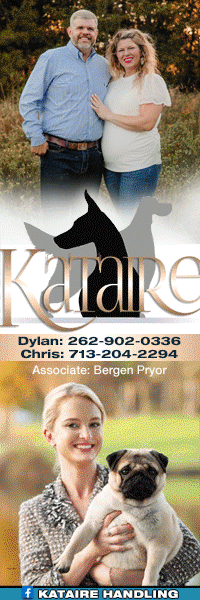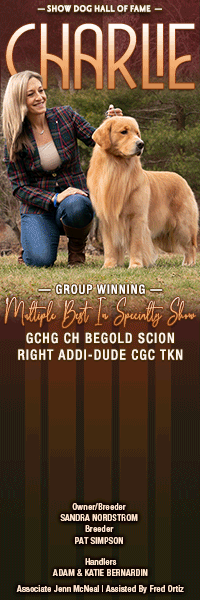From The Publisher
Click here to read the complete article
10 – October, 2014
By Tom Grabe
While enjoying dinner with some doggie friends the other night, the topic of judging found its way into our conversation. (surprise, surprise!) However, this wasn’t the typical discussion about how the merits, or lack thereof, of today’s judges. This conversation was about the reasons people choose to judge dogs. We wondered aloud why people want to become judges and why some attempt to gain approval for more breeds as soon as possible.
The six of us had nearly 200 years of combined experience in the sport of purebred dogs. Every one had bred, owned or exhibited Best in Show and National Specialty winners. In short, they weren’t lacking experience when it came to discussing the sport. Their opinions regarding the reasons people judge were assorted. However, their opinion about why most choose to attain approval to judge as many groups as possible as quickly as they can was nearly unanimous.
We all agreed there is a desire to travel the country judging dogs while seeing friends on a regular basis. Someone commented about the monetary aspect. There is money to be made by judging every weekend. Some judges depend on that income to pay the bills.?We all agreed that the social and financial aspects of judging on a regular basis far outweighed the more noble purpose of judging – finding the best breeding stock or protecting the standard.
As the conversation progressed, one person mentioned it is very hard to get hired if you don’t have at least two, preferably three or more, groups. Show chairpersons need multiple group judges to cover the gaps and besides, it saves money, they claimed. They said if you have a few breeds or half a group, you may never get called unless you have a reputation within those breeds, and even then you’ll be lucky to get a few assignments a year.
In my opinion, it was a sad but true commentary on our current state of judging. We have the same people judging nearly all of the shows and some of them are there for the wrong reasons. A few even lack the desire to learn much about the breeds in the groups they judge. They are there for social interaction. They are there to pay the bills. Some are there to protect the standard and educate the exhibitors who paid their hard-earned money for their opinion. Those are the people I applaud.
My concern is how this impacts the sport. Does having the same core group of judges passing judgement on the same breeds across the country every week, year-in and year-out, negatively affect the breeds? Does it impact the learning curve of the new, or fairly new, participant? Does it impact the entries of shows negatively, or positively?
I don’t know the answer to these questions. I do think, however, that when only a small percentage of the nearly 3,600 AKC judges oversee the bulk of the shows, it probably is not entirely healthy for the sport. I also believe that some show chairpersons could work a bit harder at filling their panels with multiple breed judges instead of multiple group judges and still save money. They could hire local talent or provisionals and save a great deal on travel alone.
What do you think? Do most judges seek assignments because they enjoy finding the best dogs or because they enjoy finding the best company for dinner?
Short URL: http://caninechronicle.com/?p=61227
Comments are closed












